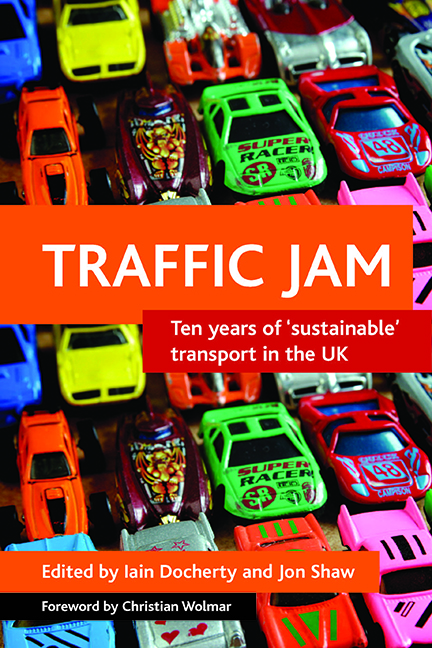Book contents
- Frontmatter
- Dedication
- Contents
- List of tables, figures and boxes
- Foreword
- Preface and acknowledgements
- List of acronyms
- Notes on contributors
- Part One Policy and politics
- Part Two Progress in policy implementation
- Part Three Ten years since A new deal for transport – signposts to the UK’s transport future?
- Index
six - Walking and cycling: easy wins for a sustainable transport policy?
Published online by Cambridge University Press: 21 January 2022
- Frontmatter
- Dedication
- Contents
- List of tables, figures and boxes
- Foreword
- Preface and acknowledgements
- List of acronyms
- Notes on contributors
- Part One Policy and politics
- Part Two Progress in policy implementation
- Part Three Ten years since A new deal for transport – signposts to the UK’s transport future?
- Index
Summary
Given that walking and cycling require little collective intervention to make possible, beyond the manufacture of shoes, clothing and bicycles and the construction and maintenance of basic infrastructure, it is not surprising that they are often regarded as the most obvious candidates for modes satisfying Bill Black's definition of sustainable transport as ‘transport that meets the needs of the present without compromising the ability of future generations to meet their own needs’ (Black, 1996, after the World Commission on Environment and Development, 1987). Yet it could easily be argued that this substantially underplays the worth of these simple yet highly effective forms of transport. Adopting the three-way economic/environmental/social conception of sustainability outlined in Chapter One, walking and cycling move from being ‘benign’ modes exerting very little environmental damage, to positive ‘active’ or ‘personal’ modes, which encourage myriad economic and social connections for very modest environmental costs. This should not come as a surprise, but is often overlooked given the generally negative language that characterises the sustainable transport narrative. In the midst of the transport ‘crisis’, generated in large part by a car-dominated transport system that does not meet our current needs nearly as well as it might – with worsening congestion, and with safety, environmental quality, social inclusion, community cohesion and personal and public health all compromised by the growth in car use – it is probably inevitable that the debate over what to do should be framed in terms of trying not to make things even worse.
Escaping, however, from this somewhat depressing analytical paradigm to a more positive, normative approach to promoting active travel alters the picture completely. As H. G. Wells is reputed to have said, ‘when I see an adult on a bicycle, I have hope for the human race’. The same is true for walking, since it is the fundamental, ubiquitous means for us as human individuals to meet one another and engage in conversation, learning and other social processes. Walking is one of the first things a child wants to do, and one of the last things an adult wants to give up (London Walking Forum, 2000), yet as a society we have been taking walking for granted.
- Type
- Chapter
- Information
- Traffic JamTen Years of 'Sustainable' Transport in the UK, pp. 117 - 138Publisher: Bristol University PressPrint publication year: 2008



